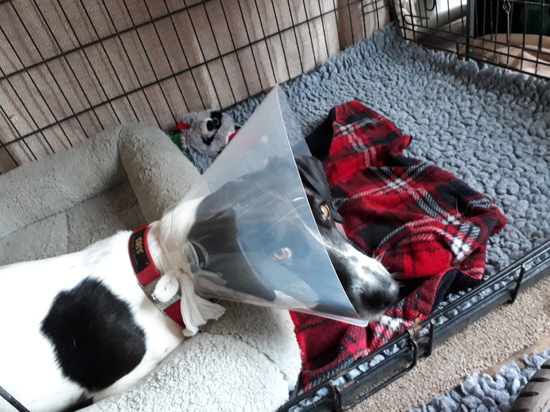
So, for those who don’t know, Brian has been in for knee surgery recently. He developed a limp in September (after a wet and muddy walking holiday) which we initially thought was due to sore pads. We tried lots of strategies to keep his pads comfortable and all seemed well.
Then the limp came back after another walking holiday in March and x-rays showed that he needed surgery.
Poor Brian!
There is a bright side to this story though.
The specialist vet initially thought that Brian was going to need a full knee replacement (eek!) but when they came to operate, it turned out the damage to his knee was a lot less extensive than they had feared and they were able to perform a much less traumatic operation.
This is good news (both for Brian’s recovery and for my wallet!) but it got me thinking about the importance of trusting your instincts when it comes to your dog.
When I worked in the NHS, I used to talk with my clients about combining their expertise with mine - I might be the expert on what was in the books (and I say ‘might’, because some of my clients were very knowledgeable), but they were definitely the experts in their own experience, and we needed to pull both together to find the best solutions.
The same is true for us and our dogs.
Brian never limped at the vets (on both occasions, by the time we made it back from holiday, the limp had gone) but I knew what I’d seen and I ended up vigilantly watching in case it came back.
As soon as it did, we took action straight away to try and get it sorted.
Because of that, Brian’s knee never got the chance to get extensively damaged and his recovery chances now are much better.
My take home message from this?
Trust your instincts. You know your dog; you live with them day in, day out and you’re in the best position to spot when something changes.
You’ll know when something isn’t as it usually is.
And if you act fast, it’s easier. Whether it’s something physical that doesn’t have time to cause long standing damage, or something behavioural that doesn’t have time to become ingrained, prevention is definitely better than cure. So, keep an eye out.
If something changes in how your dog moves, or in how your dog acts, and you don’t understand why, check it out. Ask your vet. Talk to our behaviour team. Find the right specialist.
Your dog may not thank you straight away (Brian says that puppy prison is tolerable, but the cone of shame is NOT!) but in the long run, if it is something that needs working on, you’ll definitely thank yourself!
Have a happy and healthy week!
Laura & Brian
PS If your dog isn't recovering from surgery why not book onto Sian's Introduction to Parkour.
Sunday 8th July, nr York
There's just four places left on this workshop now:
https://app.acuityscheduling.com/schedule.php?owner=13187434&appointmentType=category%3AWebinars%2C%2BSeminars%2B%26%2BWorkshops

No comments:
Post a Comment